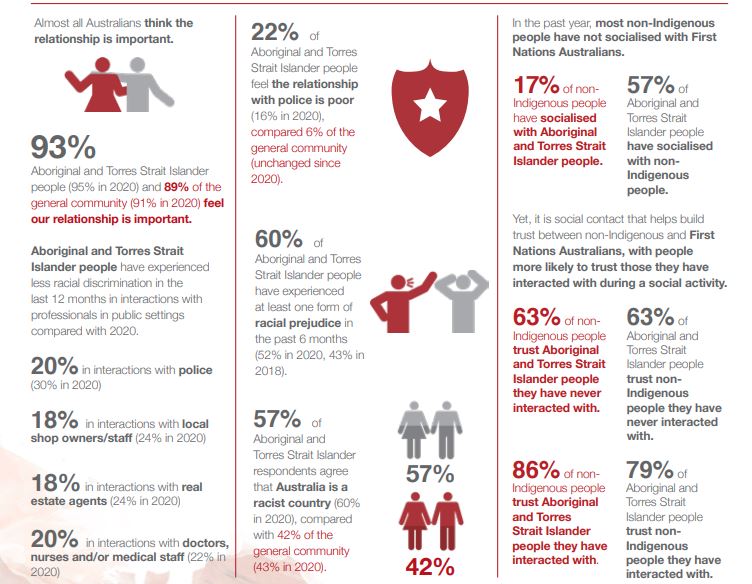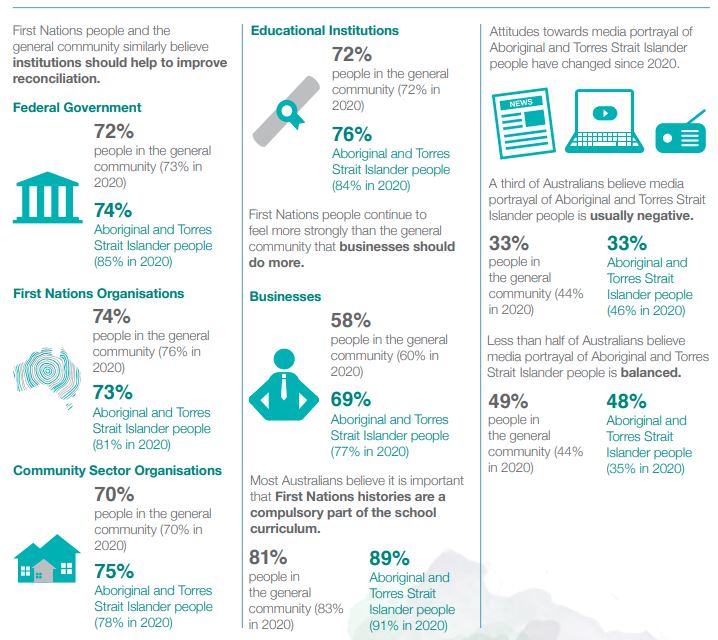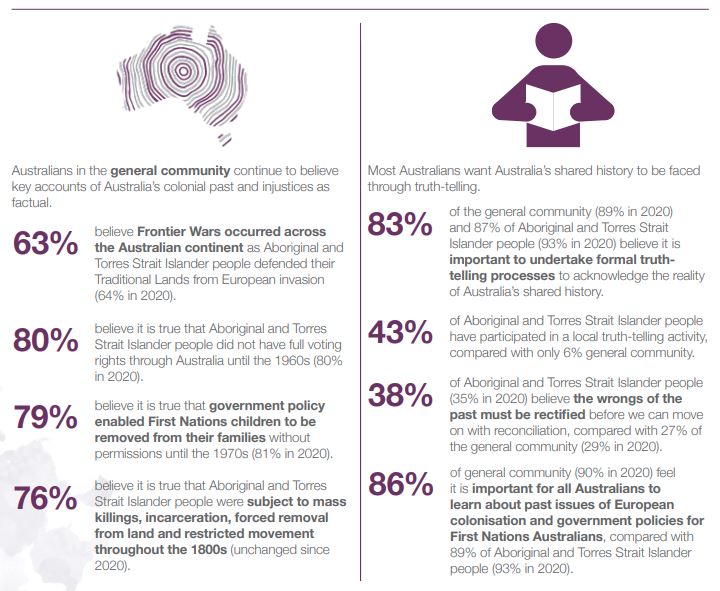What is the Australian Reconciliation Barometer?
Every two years, our partners at Reconciliation Australia conduct a national research study, and publish their findings in The Australian Reconciliation Barometer (ARB). It measures the progress of reconciliation between Aboriginal and Torres Strait Islander people and non-Indigenous Australians. It measures people’s attitudes towards reconciliation, using the five dimensions of reconciliation—race relations, equality and equity, unity, institutional integrity, and historical acceptance—to inform data collection and analysis.
The Five Dimensions of Reconciliation
Race Relations
All Australians understand and value Aboriginal and Torres Strait Islander and non-Indigenous cultures, rights and experiences, which results in stronger relationships based on trust and respect that are free of racism.
Equality and Equity
Aboriginal and Torres Strait Islander peoples participate equally in a range of life opportunities and the unique rights of Aboriginal and Torres Strait Islander peoples are recognised and upheld.
Unity
An Australian society that values and recognises Aboriginal and Torres Strait Islander cultures and heritage as a proud part of a shared identity.
Institutional Integrity
The active support of reconciliation by the nation’s political, business and community structures.
Historical Acceptance
All Australians understand and accept the wrongs of the past and the impact of these wrongs. Australia makes amends for the wrongs of the past and ensures these wrongs are never repeated.
How Reconciliation NSW Plays Its Part
To make advancements in The Five Dimensions of Reconciliation, Reconciliation NSW do the following:
Support
- We connect individuals and organisation with information, resources and services relating to reconciliation
- We work with and support an independent network of Local Reconciliation Groups, who host a range of events and activities to advance reconciliation in their communities
- We work with community partners to connect schools with Aboriginal Elders, artists, writers and educators
- We encourage organisations in NSW to develop their own Reconciliation Action Plans and provide support for their development and implementation
- We work with Aboriginal and Torres Strait Islander stakeholders to advocate and influence policy discussion to advance social justice, equity and self-determination
Educate
- We build cultural awareness and competence
- We actively provide resources and tools to increase the knowledge, understanding and commitment of the wider community to engage with Aboriginal and Torres Strait Islander peoples, histories, cultures and equity
- We create programs and events to engage NSW and ACT school students and educators in reconciliation, such as the Schools Reconciliation Challenge
- We provide curriculum-aligned resources and tools to enable NSW teachers to embed Aboriginal and Torres Strait Islander content and perspectives into everyday learning
Inspire
- We encourage NSW Parliament’s bi-partisan commitment to reconciliation by hosting a program of events through Reconciliation in Parliament
- We provide a platform for open discussion and community interaction around racism through events such as I’m Not Racist, But …
- We work with communities around NSW to build a people’s movement to support and advance agreement making, constitutional reform and truth-telling processes in NSW
- We work to promote greater engagement in reconciliation at the local government level
- We actively participate in the Australian Reconciliation Network to contribute to a national reconciliation agenda.
More Resources on the Australian Reconciliation Barometer
Read the 2022 Australian Reconciliation Barometer SUMMARY REPORT
Read the 2022 Reconciliation Barometer FULL REPORT (173 pages)
You can find out more about Reconciliation Australia’s work here
2022 Report Key Findings
The 2022 Australian Reconciliation Barometer shows that Aboriginal and Torres Strait Islander people and the general community believe the relationship between each other is important . Nearly all Australians want Aboriginal and Torres Strait Islander people to have a say in their own affairs as evident in the increased support for a treaty. However, inequality and racism against Aboriginal and Torres Strait Islander peoples still stand in our way.





